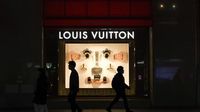Shares of LVMH Moët Hennessy Louis Vuitton SA, the world’s largest luxury goods conglomerate, plunged as much as 8% on Tuesday morning, April 15, 2025, following a disappointing report on first-quarter sales. This unexpected decline not only impacted LVMH’s stock but also caused a ripple effect throughout the luxury sector, with rival Hermès briefly surpassing LVMH in market capitalization.
In a trading update released shortly after the market closed on Monday, April 14, LVMH reported a 3% year-on-year fall in organic sales, totaling €20.311 billion ($23 billion). Analysts had anticipated a slight growth of 2%, making the report a significant miss. The luxury giant's performance was particularly disappointing in Asia, where sales excluding Japan tumbled by 11%. The U.S. market also showed weakness, with a 3% decline in sales, while Japan experienced a 1% drop, attributed to a decrease in Chinese tourism.
Following the release of these figures, shares of Kering fell by 2.5%, Burberry dropped 4.4%, and Richemont declined by 1.6%. During morning trade on Tuesday, LVMH’s market capitalization fell to €247.1 billion ($280.6 billion), while Hermès’ market cap reached €244.53 billion, a notable shift in the luxury landscape.
The decline in LVMH's sales was most pronounced in its wines and spirits division, which saw revenues drop by 9%. Chief Financial Officer Cécile Cabanis noted that the company faced weaker demand for cognac—a key product—particularly in the U.S. and China, regions that have been affected by ongoing geopolitical tensions. The fashion and leather goods division, which accounted for 78% of LVMH’s profit in 2024, also reported a 5% decline in sales.
Analysts from Citi, Thomas Chauvet and Mahesh Mohankumar, commented that the results were “overall below the most conservative buyside expectations.” They expressed concerns about the luxury sector's ability to recover in the coming quarters, citing elevated economic uncertainty both in the U.S. and globally. Their note highlighted that it was difficult to foresee any sequential revenue improvement for LVMH or the luxury sector as a whole.
In light of these challenges, analysts at Jefferies lowered their target price for LVMH shares from €670 to €510 ($578.62), reflecting a cautious outlook on the luxury market's recovery. Morgan Stanley analysts echoed this sentiment, downgrading LVMH shares to Equal Weight and projecting another sales decline for the second quarter of 2025.
“The difference this time is that demand from China is a major drag,” Morgan Stanley analysts noted, adding that the luxury industry is facing a softer macroeconomic environment after having raised prices significantly. They predicted that LVMH and the broader luxury sector would likely see anemic growth over the next 12 months.
Despite the troubling sales figures, LVMH’s Chief Financial Officer indicated that the company is prepared to implement mitigation strategies if tariff negotiations remain unproductive. Cabanis mentioned that price increases could be part of the strategy, as LVMH’s luxury goods have more pricing power due to their affluent customer base. However, she acknowledged that the current economic climate has led to a significant decline in overall demand, impacting even high-end retailers.
Under President Trump’s revised tariffs, China faces a staggering 125% tariff, while the rest of the world sees a 10% levy on goods. This is particularly concerning for LVMH, as China comprises 30% of its total revenue, making it one of its largest markets. U.S. sales contribute another 25% to the company’s revenue, underscoring the importance of these markets to LVMH’s overall performance.
In response to these challenges, LVMH is considering increasing its manufacturing footprint in the U.S. to better meet local demand. Currently, the company operates three manufacturing facilities in the U.S., which serve around a third of its domestic demand. Cabanis emphasized that while there is potential for increased U.S. production, it is not an overnight process and requires time to recruit and train skilled workers.
As LVMH navigates these tumultuous waters, it remains focused on managing through current macroeconomic uncertainties. The company is closely monitoring demand across various geographies while preparing for potential changes in its operational strategies.
In summary, LVMH’s disappointing first-quarter sales report has sent shockwaves through the luxury sector, causing significant declines in stock prices and raising concerns about the future of the industry amid ongoing geopolitical tensions and economic uncertainty. With Hermès briefly taking the crown as the world’s largest luxury firm, all eyes will be on LVMH as it seeks to recover from this setback and adapt to the evolving market landscape.







